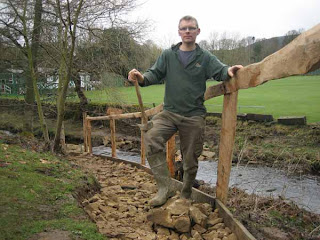Back in April after a day breaking stones for a new footpath I wrote asking if hard work was good or bad.
Jeff one of my blog readers in the US mentioned a new book by Matthew Crawford. "Shopcraft as Soulcraft:An Inquiry into the Value of Work" It was not out in the UK so I ordered it from the US and now I have read it I can highly recommend it. It is not written from a craft perspective but from someone who fixes old motorbikes, something I have spent many hours doing but the ideas are totally relevant to anyone who works with skill with their hands. Matt studied philosophy and worked for a New York "think tank" before opting out to run a bike repair shop so the discourse may get a little esoteric for some at times but it is peppered throughout with amusing and insightful personal experiences from the workshop.
The good news is that it is now available in the UK and since we don't have "shop class" we get an Anglicised title "The case for working with your hands; or why office work is bad for us and fixing things feels good." It is a polemic, starting from a set position and defending it rather than an objective balanced inquiry but it is done in good humour. It doesn't really consider the possibility of a balanced life consisting of good office work with some fulfilling physical activity in leisure time.
One new idea which I had never really considered went a little like this. From the 1950's onwards physical work and blue collar jobs have been looked down upon as people began to look forward to the knowledge economy, we let China make everything and we would make money from information technology. For quite a few years it looked like an office job was the thing to have and manual work was never going to get you anywhere. The point that Matt makes is that now the office has gone through something not unlike the industrial revolution, where jobs have been deskilled and most of the decision making has become formalised and standardised. Individuals follow formulas instead of making decisions themselves. Once the job has been deskilled companies are finding that they can outsource those office jobs to places where wages are cheaper too. In fact looking to the future with instant global communication there are not a great many jobs that can't be outsourced to areas of cheaper labour except the skilled trades such as building, plumbing, fixing cars. So Matt argues if you want a job for your kids with a certain future encourage them to learn a trade.
I very much enjoyed the book and would recommend it, I think that having intellectual folk make a conscious choice of working with their hands and writing eloquently about it raises the status of manual work which I feel is a good and honourable thing.
For another write up see this article from the Telegraph and just because I love old bikes too let's finish with a picture of Matt in his workshop with a gorgeous old bevel drive Ducati.
Subscribe to:
Post Comments (Atom)








I taught a spoon carving course with 12/13 year old boys at a school a few weeks ago. Out of seven pupils not one had ever used a handtool before. After only a few minutes of using a light-weight axe, or whittling a tiny amount of wood with a small knife, they all complained of having sore hands. Not only did they struggle to concentrate for more than a few minutes but they had no inclination to try harder or to come back to using a tool after a short rest. I showed them how to warm-up the tendons in their forearms and to strecth before working. Ok, so using handtools for the first time would be a challenge for any person but they did want to make a spoon, they just didn't want to do any work to achieve it.
ReplyDeleteWhen I asked their teacher why they didn't use handtools in school, I didn't get an answer about Health and Safety. The reason why they don't use handtools is becuase the people who set the exams want to see "problem solving", not practical skills.
I wonder, if my problem is that I have no spoon with which to eat, how would I solve that?
Another good book emphasising the paramount importance of working with your hands but which approaches the issue somewhat from another direction is "The Hand: How Its Use Shapes the Brain, Language, and Human Culture" by Frank R Wilson
ReplyDelete